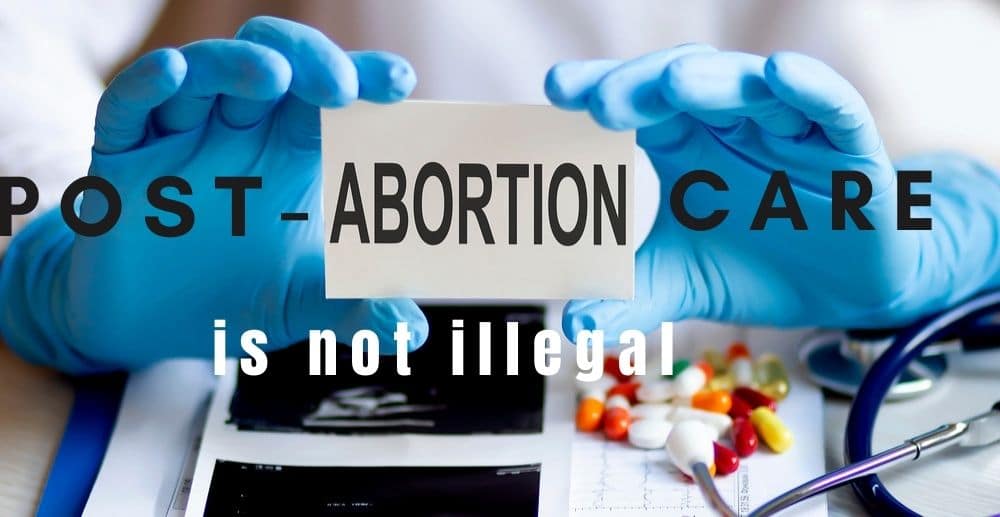Post-abortion care refers to the bundle of care that is needed to reduce the risk of complications following an abortion (spontaneous and unsafe abortion). If you’re experiencing problems following an abortion, it’s very important that you seek help. You can contact Marie Stopes for a confidential chat.
Unsafe abortion remains one of the commonest causes of maternal deaths, accounting for hundreds of thousands, and millions of lifelong complications, annually. Most of these deaths, and complications, are recorded in the third world, largely due to the strict abortion laws existing in these places, Nigeria inclusive.
Fortunately, a greater proportion of abortion-related mortalities, and complications, do not creep up on one like a thief in the night, unannounced; there’s almost always warning signs, some of which may drag on for days, or even weeks, before the final blow.
This means that even when primary prevention has failed, there’s still enough room for secondary prevention. The only enemy is the culture of SILENCE entrenched and enabled by the stigma attached to induced abortions.
The aim of this article is to reduce the incidence of post abortion mortality and morbidity by educating people on the basics of post-abortion care, how to recognize warning signs early enough for timely intervention and emphasizing the importance of breaking silence.
Post-abortion care is not illegal in Nigeria
It is important to note that, while abortion is illegal in Nigeria, post-abortion care IS NOT! This means that you can easily walk into any Hospital and access post-abortion care, especially in the setting of an emergency, and with no judgement.

1. This article is meant for a woman who may find herself in a position of the dire need for post abortal care, and will therefore be dealing largely on out-of-hospital care, and will also be written from the patient’s perspective as much as possible.
2. While this article is primarily meant for induced abortions, it could also be applied to spontaneous abortions [miscarriages], including ones occurring within the confines of marriage.
Complete and incomplete abortions- Differentiating between the two
Post-abortion, whether induced or spontaneous, the most important question is, is the abortion complete or incomplete. This question is particularly important as whether the abortion is complete, or not, is an important predictor of whether things are likely to go south, or not.
An incomplete abortion, in which there’s still remnants of the products of conception in the womb, is saddled with life-threatening complications, such as overwhelming infection, and bleeding potentially to the point of exsanguination; while the likelihood of such complications in a completed abortion is minimal.
Once an abortion process is completed, and the conceptus is expelled, pain either ceases abruptly, or reduces remarkably; and bleeding reduces to trickles, or at least reduces significantly. If pain continues to be severe, and bleeding heavy, the process is most likely incomplete, or yet to be completed, irrespective of whether some foetal parts have been passed or not. If this drags on longer, RUSH TO A HOSPITAL!
Post-abortion Vigilance- Looking out for the warning signs
In the days to weeks following an abortion, one needs to watch her body like a hawk, taking note of the slightest changes. Any significant deviation from the norm should be reported ASAP. However, special attention should be paid to the following red flags.
Fever
Fever, after an abortion– especially if it is high grade, and accompanied with shaking chills, loss of appetite, and vomiting– is an OMINOUS sign. It usually points towards post abortal sepsis, a serious infection, which is one of the commonest causes of abortion-related death. Every fever post-abortion MUST BE REPORTED. It is better to cry wolf when it is actually a cat, than to risk the beast devouring one in her sleep!
Haemorrhage
This is the fancy name for bleeding. Vaginal bleeding is a normal occurrence post abortion. In some cases it may even last up to two weeks after the abortion process has been completed, but usually as spotting, or dark red blood. However, if bleeding continues to be bright red, and heavy, for longer than an hour; RUSH TO A HOSPITAL!
Also, rush to a hospital, if the bedding is associated with any of these;
- clots
- dizziness
- racing and a pounding heart
- fast breathing
- fainting spells
- Abdominal Pain
This may linger on, as mild cramps, even when the abortion has been completed, for days. However, it calls for urgent review when there’s presence of the following;
- persistent severe abdominal pains
- new-onset severe abdominal pains, days after the abortion, especially if it is associated with a fever.
Vaginal Discharge
The presence of a copious, foul-smelling vaginal discharge, days to weeks after an abortion, especially if associated with abdominal pain, is an ominous sign, and calls for an urgent review in a hospital. It usually points towards a retained product, endometritis, or a pelvic inflammatory disease (PID).
Post-abortion Care
Apart from being vigilant, and looking out for the above mentioned red flags, which is more or less passive, one also needs to take active steps to prevent or reduce the risk of, both acute and long term complications. The following may help.
Confiding In Someone
Abortion is not something you do alone, and then go and lock yourself in a room. Someone needs to be aware of it, someone needs to be checking in on you, someone needs to be in the know, so as know when to take you for a much-needed intervention.
Bed Rest
Bed rest is advised for at least for the first two days post-abortion. This is because a lot of blood may have been lost, and the body needs time to compensate for it. Standing may lead to fainting from orthostatic hypotension.
Drugs
Antibiotics, analgesics, and blood tonics are needed in the acute phase. Of these, the most important are antibiotics, especially if it was a D and C, or an MVA, as opposed to the use of abortion pills. Broad-spectrum antibiotics, at least two, is recommended for a minimum of 5 to 7 days. If possible, injections should be given for the first 1 to 2 days.
Abdominal Scan
Doing an abdominopelvic ultrasound to confirm whether the abortion has been completed and that there’s nothing remaining in the womb, is advisable.
Abstinence From Sex
Evidence shows that penetrative sex increases the risk of infections in the immediate post abortal period. So, abstinence is advised for at least the first 1 to 2 weeks.
Sanitary Pads Over Tampons
Use of sanitary pads is preferred over the use of tampons. Insertion of tampons, in the post abortal period, increases the risk of infections as well.
Contraception
Contraception is an important key component of post abortion care. It is not just important for the prevention of another unwanted pregnancy, and hence abortion, but it’s also important to prevent high risk pregnancies in married couples. This is because, pregnancies conceived within 6 months of a miscarriage/abortion, are at higher risk of premature rupture of membrane, preterm labour, and low birth weight babies.
TRUTH
If for any reason you develop any complication, and go to a hospital, do not wait to be asked before you volunteer the information. Truth could go a long way to save, not just your reproductive career, but also your life. Trust me, I have seen lies concerning abortion-related complications kill people!
About the author

Dr Chibuike Joseph Chukwudum
Dr Chibuike Joseph Chukwudum is a doctor who Studied Medicine and Surgery at Nnamdi Azikiwe University Awka. He is the former Medical Officer at Oakland specialist hospital,obosi.He also previously worked at Nnamdi Azikiwe University Teaching Hospital, Nnewi, Anambra State.